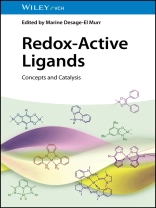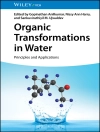Authoritative resource showcasing a new family of ligands that can lead to better catalysts and promising applications in organic synthesis
Redox-Active Ligands gives a comprehensive overview of the unique features of redox-active ligands, describing their structure and synthesis, the characterization of their coordination complexes, and important applications in homogeneous catalysis. The work reflects the diversity of the subject by including ongoing research spanning coordination chemistry, organometallic chemistry, bioinspired catalysis, proton and electron transfer, and the ability of such ligands to interact with early and late transition metals, lanthanides, and actinides.
The book is divided into three parts, devoted to introduction and concepts, applications, and case studies. After the introduction on key concepts related to the field, and the different types of ligands and complexes in which ligand-centered redox activity is commonly observed, mechanistic and computational studies are described. The second part focuses on catalytic applications of redox-active complexes, including examples from radical transformations, coordination chemistry and organic synthesis. Finally, case studies of redox-active guanidine ligands, and of lanthanides and actinides are presented.
Other specific sample topics covered include:
- An overview of the electronic features of redox-active ligands, covering their historical perspective and biological background
- The versatility and mode of action of redox-active ligands, which sets them apart from more classic and tunable ligands such as phosphines or N-heterocyclic carbenes
- Preparation and catalytic applications of complexes of stable N-aryl radicals
- Metal complexes with redox-active ligands in H+/e- transfer transformations
By providing up-to-date information on important concepts and applications, Redox-Active Ligands is an essential reading for researchers working in organometallic and coordination chemistry, catalysis, organic synthesis, and (bio)inorganic chemistry, as well as newcomers to the field.
Mục lục
Preface xi
Part I Introduction and Concepts 1
1 Anatomy of a Redox-Active Ligand 3
Marine Desage-El Murr
1.1 Introduction 3
1.2 Biological Inspiration: From the Enzyme to the Flask, a Continued Journey 4
1.3 Chemical History: Puzzle-Solving for Coordination Chemists 6
1.4 Combining Spectroscopy and Theory: How to Spot a Redox-Active Ligand? 9
1.5 Non-innocent, Cooperative, Electro-Active, or Redox-Active? 10
1.6 Unusual Ligands and Unusual Reactivities with a Redox-Active Ligand 12
1.7 Perspectives and Concluding Remarks 15
2 Mechanistic Studies of Catalytic Nitrene-Transfer Reactions Involving Redox-Active Ligands and Substrates 21
Nicolaas P. van Leest, Jarl Ivar van der Vlugt, and Bas de Bruin
2.1 Introduction 21
2.2 Characterization of Radical-type Intermediates 23
2.3 Mechanistic Studies 29
2.4 Case Studies for Nitrene Transfer Aided by Redox-Active Ligands and Substrates 33
3 Redox-Active Ligands From a Computational Perspective 53
Roy Eckhardt, Dorys Reyes, Christian Sandoval-Pauker, and Balazs Pinter
3.1 Introduction 53
3.2 Electronic Structure Determination Through DFT and Spectroscopy 55
3.3 Redox-Active Ligands as Electron Reservoirs 63
3.4 In Silico Description and Engineering of Redox-Active Ligands 84
3.5 Conclusions 98
Part II Applications 107
4 Complexes of Stable N-aryl Radicals and Their Catalytic Applications 109
Nicolas Leconte and Fabrice Thomas
4.1 Introduction and General Considerations on Exocyclic N-aryl Radicals 109
4.2 Complexes Featuring Anilinyl Radicals 111
4.3 Bidentate o-diaminobenzenes and Their Radicals 115
4.4 Pincer Ligands and Their Radicals 124
4.5 Branched Tetradentate o-diaminobenzene and Associated Radicals 128
4.6 Polydentate Ligands Featuring One Bidentate Diiminosemiquinone Radical 130
4.7 Representative Catalytic Applications 135
4.8 Conclusion 140
5 Redox-Active Ligands in Coordination Chemistry and Organic Synthesis 151
Toru Amaya, Toshiyuki Moriuchi, and Toshikazu Hirao
5.1 Introduction 151
5.2 Controlled Formation of Conjugated Complexes with Redox-Active Polyanilines or 1, 4-Benzoquinonediimines 152
5.3 Catalytic Application of Hybrid Systems Consisting of Redox-Active Polyanilines and Transition Metals 162
5.4 Conclusion 169
6 Metal Complexes Bearing Redox-Active Supporting Ligands that Promote Chemical Transformations Involving Protons and Electrons 175
Kundan K. Singh and Isaac Garcia-Bosch
6.1 Introduction 175
6.2 Dioxygen Reduction to Water 177
6.3 Dioxygen Reduction Coupled with Substrate Dehydrogenation 179
6.4 Dioxygen Reduction Coupled with Substrate Hydroxylation 187
6.5 Conclusions and Future Perspectives 192
Part III Case Studies 197
7 Redox-Active Guanidine Ligands 199
Hans-Jörg Himmel
7.1 Introduction 199
7.2 Properties and Reactivity of Uncoordinated Redox-Active Guanidines 200
7.3 Redox-Active Guanidines as Ligands in Coordination Chemistry 206
7.4 Perspectives 241
8 Coordination Chemistry with Lanthanides and Redox-Active Ligands 249
Valeriu Cemortan and Grégory Nocton
8.1 Introduction 249
8.2 Quinone, Iminoquinone, and O-phenylenediamine-Based Complexes 250
8.3 Diazadienes 262
8.4 Iminopyridines and Bis(imino)pyridines 271
8.5 Nitroxides 277
8.6 N-heterocycles 280
8.7 Conclusion and Outlook 299
9 Actinide Complexes of Redox Non-innocent Ligands 317
Karlotta van Rees and Jason B. Love
9.1 Bipyridyl Ligands 318
9.2 Pyrrole Ligands 320
9.3 Tmtaa Ligand 323
9.4 Schiff-Base Ligands 324
9.5 Pyridine(di-imine) Ligands 329
9.6 Phosphite Ligands 332
9.7 Quinone Ligands 332
9.8 Aryloxide Ligands 335
9.9 Conclusion 338
References 339
Index 343
Giới thiệu về tác giả
Marine Desage-El Murr is professor and group leader at the University of Strasbourg (France) since 2017. She obtained her Ph D in 2003 under the supervision of Dr. Charles Mioskowski at the Commissariat à l’Energie Atomique (CEA Saclay, France). She was then a post-doctoral research fellow at the University of Newcastle-upon-Tyne (UK) working in the groups of Prof. Roger J. Griffin and Prof. Bernard T. Golding. In 2007, she joined the Institut Parisien de Chimie Moléculaire (IPCM) at the Université Pierre et Marie Curie (UPMC) in Paris as assistant professor. Her research interests are centered around bioinspired catalysis, ligand-based electron transfers, and redox catalysis.












